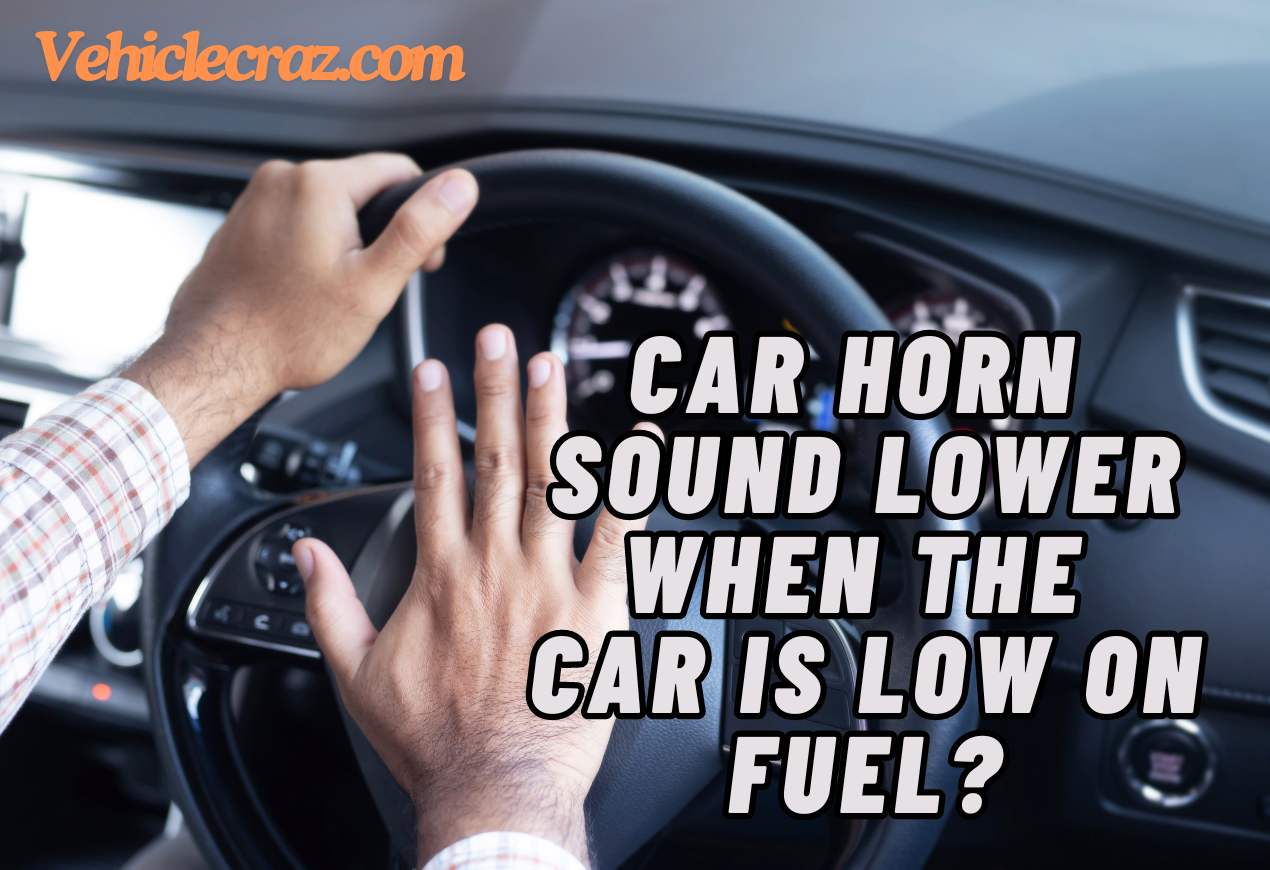Why Does the Car Horn Sound Lower When the Car is Low on Fuel?
Have you ever noticed that your car horn sounds lower when your vehicle is running low on fuel? While this may seem unrelated, there’s a connection between your car’s fuel level and its electrical system. When your vehicle is low on gas, it may affect the performance of various components, including the horn. Want a deeper analysis? Keep reading!
Can Low Fuel Levels Directly Affect the Car Horn’s Sound?
At first glance, it might seem like the fuel level has nothing to do with the car horn. After all, fuel powers the engine, not the electrical components, right? In reality, low fuel levels can have an indirect impact on other vehicle systems, including the electrical system that powers the horn.
A low fuel level itself doesn’t directly change the sound of the car horn. The horn relies on the car’s electrical system, and there’s no physical connection between the amount of fuel and the horn’s functionality.
However, when fuel levels drop, your car’s engine and other systems may start to work less efficiently. This can indirectly affect how much power is available for secondary systems, such as the horn. The electrical system might prioritize the engine’s needs, leading to reduced power for components like the horn.
Related: Can A Car Horn Run Out of Honk?
How Does the Car’s Battery and Electrical System Affect the Horn?
The car horn relies heavily on the battery and alternator to function correctly. If the electrical system isn’t working at full capacity, the horn’s sound may be affected. Here’s how:
The alternator generates power to run the car’s electrical systems and charge the battery while the engine is running. When the fuel level is low, the engine may struggle, and the alternator’s efficiency can be compromised. This can result in reduced power supply to the horn, causing it to sound lower in pitch.
The battery provides electrical energy when the engine isn’t running, such as when you first start the car. If the battery is weak or not fully charged, the horn might not receive enough voltage, leading to a lower or weaker sound.
A drop in voltage can directly impact the horn’s performance. Car horns typically require a specific amount of voltage to operate correctly. If the voltage drops below this threshold, the horn will produce a weaker, lower-pitched sound.
Why Does a Car’s Electrical System Strain When Fuel is Low?
While the connection between low fuel and the car’s electrical system may seem unclear, they are linked. Here’s how low fuel can indirectly strain your car’s electrical system:
When fuel levels are low, the engine may not run as efficiently as it does with a full tank. A struggling engine can cause the alternator to work harder to maintain electrical supply. This can result in reduced power output to non-essential components like the horn.
The fuel pump, which delivers fuel from the tank to the engine, has to work harder when fuel levels are low. This extra effort can draw more power from the electrical system, leaving less available power for other components, including the horn.
Related: Car Horn Not Working After Rain?
Could a Faulty Alternator Cause Both Low Fuel and Horn Issues?
Sometimes, the issue may not be low fuel alone but a deeper problem within the car’s electrical system, such as a faulty alternator.
If your alternator is failing, it may not charge the battery properly or provide enough power to the electrical system. This can cause various issues, including a horn that sounds weaker. Additionally, if the alternator isn’t functioning correctly, the fuel pump may not work efficiently, making it seem like fuel levels are affecting the car’s performance when it’s actually an alternator issue.
A faulty alternator can also affect fuel efficiency, leading to the appearance of related issues. If the alternator isn’t charging the battery effectively, both the engine and other components may struggle to run properly.
Are There Other Factors That Affect the Sound of a Car Horn?
Aside from low fuel and alternator issues, several other factors can cause your car horn to sound lower:
Wiring Issues
A problem with the wiring connecting the horn to the car’s electrical system can reduce the voltage reaching the horn. This can cause the horn to sound quieter or lower in pitch.
Wear and Tear
Over time, car horns can wear out. Diaphragms may become less flexible, or other internal components may degrade, leading to a change in sound quality.
Corrosion
Corroded terminals or connectors can reduce the power flow to the horn, causing it to sound weaker.
How to Fix a Car Horn That Sounds Lower When the Car is Low on Fuel?
If you notice that your car horn sounds lower when your fuel level drops, there are a few things you can check:
- Ensure that your battery is fully charged and in good condition. A weak or dying battery can cause electrical issues that affect the horn.
- Have a professional check the alternator’s output to ensure it’s charging the battery properly and supplying enough power to the car’s electrical system.
- Inspect the wiring leading to the horn for any signs of damage or corrosion that could be affecting the power supply.
- If your car is consistently struggling when fuel is low, have the fuel pump inspected to ensure it’s not drawing excess power.
Conclusion
While it may seem strange that your car horn sounds lower when the vehicle is low on fuel, the connection lies in the car’s electrical system. The horn relies on the battery and alternator for power, and if the engine is under strain due to low fuel, the electrical system may prioritize essential functions over components like the horn.
To fix this issue, ensure your battery and alternator are functioning properly, and inspect the fuel pump and electrical connections if needed. By understanding this connection, you can keep your horn working at full volume and ensure your car’s electrical system runs smoothly.


I’m Alex, a seasoned mechanical teacher with over 20 years of hands-on experience in Australia. My passion for all things automotive has driven me to establish this blog, aiming to share my wealth of knowledge and expertise with fellow enthusiasts, DIYers, and anyone keen on understanding the mechanics behind the machines we rely on daily.







